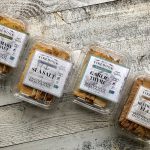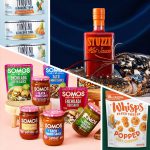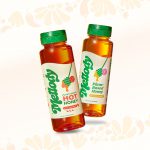Hain Celestial, Snyder’s-Lance and Dean Look Internally for Growth
As the year comes to a close, some of food’s largest players are entering a period of self reflection and turning inward, focusing on their own teams and product assortment.
Dean Foods, Hain Celestial and Snyder’s-Lance all held their quarterly earnings calls this week. While each saw varying levels of success this quarter, all three spoke about how they are looking to build up their core brands in order to achieve efficiencies and boost future earnings.
Hain Celestial Bets on Strength of Core Brands
A year after Hain Celestial ceased to release quarterly earnings reports due to revenue irregularities, the organic and natural foods maker is back to releasing regular earning reports — and this year’s is a good sign. The company reported Tuesday that net sales in the U.S., the company’s largest market, increased four percent. The growth is largely attributed to both the addition of activist investor Engaged Capital, which took an almost 10 percent stake in the company in June, and the company’s internal cost-saving initiative called Project Terra.
“Over the last 24 years, we have assembled one of the most attractive portfolio of assets in our space. Looking forward, we will continue to evaluate all opportunities to build upon our platforms, strengths and eliminate complexity and enhance margins, including accretive acquisitions and non-core divestitures. I believe that tremendous value remains to be realized given the strength of our brands, our growing product, Project Terra and our people and our loyalty of our customers and consumers,” longtime president and co-CEO Irwin Simon said on the call. “We’re excited with what’s ahead for Hain, and we’re in the early innings of our business transformation with the greatest opportunity ahead.”
To stay on the right track, Irwin told investors that the company will continue to evaluate its current portfolio to figure out what is best positioned for success under this umbrella.
“If you look at our protein business, and it’s a hot category, and you recently saw Hormel just paid a tremendous price for a protein business,” Simon said. “Is it better off in someone’s hands that’s already in that business?”
Co-CEO Gary Tickle added that the company’s overall goal “is to unlock the significant potential of Hain U.S. in our core top 500 SKUs and the 11 priority brands while reducing cost and complexity.” Part of the strategies around the brand’s core brands involve a recognition of the evolving retail landscape, specifically in regards to e-commerce and how it is changing everything from marketing to pricing.
“I think everybody out there is focused on two things: data and content. And good content or good brands and good products, and supporting your brands and driving household penetration will drive sales,” Simon said. “It’s not about price, price, price anymore, and I think on commodity items, it is, but organic products, natural products, I think it’s important that you get out there and you bring awareness to your brands.”
Snyder’s-Lance Gives Peek into Non-Core Brands Divestment
Snyder’s-Lance executives gave investors a bit more insight into their long discussed plans to review the more than 2,000 SKUs within the brand’s portfolio.
The snack maker, which reported a 10.5 percent boost in earnings compared to the same period a year ago, told investors that while most of SKU rationalization will take place in the first quarter of next year, the company is using the rest of this year to do a large cleanup of SKUs “that either had very, very low volumes already or non-existent volumes.”
“It was largely just removing things from the portfolio that were already dead or dying on the vine,” CEO Brian Driscoll said. “So, it’s not really until next year that you’ll feel the full weight of any actions.”
Driscoll added that Wholey Cheese!, which launched this year and is a decidedly more natural-inspired product for the brand, is one of the company’s most successful products and has a high likelihood of remaining on shelves.
The shakeup is part of an effort to focus strategies on the company’s core offerings, which include including Late July, Pretzel Crisps, Diamond Foods, Kettle Potato Chips and Pop Secret. As the company’s portfolio has become increasingly splintered, so have their teams’ attentions.
The changes come as Snyder’s-Lance’s executive team has seen a shakeup in recent months. Amid warnings of earnings drops, the company saw the sudden resignations of its CEO and CFO, leaving Driscoll as CEO since late June.
Amid Dairy Drops, Dean Foods Explores How Products Fit in New Categories
Dairy producer Dean Foods reported a drop in profits for the third fiscal quarter of 2017, the company reported on its quarterly earnings call with investors Tuesday.
A key struggle for the brand has been maintaining market share amidst rising demand for plant-based dairy products.
“Our strategic pillars, including building and buying strong brands, winning in private label, and driving operational excellence, continue to be our primary focus for delivering long-term growth and shareholder value,” CEO Ralph Scozzafava said on the call.
In attempts to counter losses, the company has already expanded into non-dairy segments through its purchase of a minority stake in Good Karma Foods, a maker of non-dairy milk and yogurt, and its acquisition of Uncle Matt’s Organic, a producer of probiotic-infused juices and fruit-infused waters.
But the answers to the company’s success may not solely lie in food and beverage brands, Scozzafava hinted on the call. The company may consider entering adjacent categories, including ingredients or nutraceuticals.
“We have a large infrastructure, as you know. We got lots of trucks on the road, lots of plants, expertise in making things that are close in the dairy, refrigerated and frozen,” Scozzafava said. “I think that those all become fair game for us as we start thinking about products that we can put into the portfolio.”















